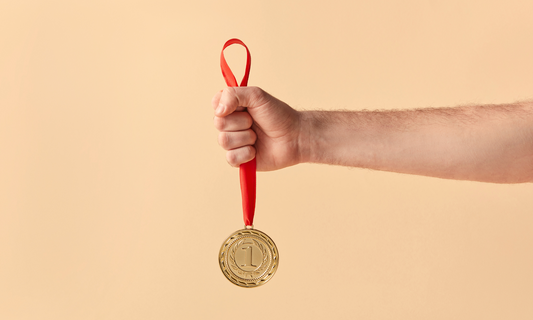Electrolytes and Running: A Complete Guide to Optimizing Your Performance

If you're a runner looking to improve your hydration and performance, you've come to the right place! Today, we'll take a look at how and when to consume electrolytes during your running outings.
The Basics: What is an Electrolyte and Why is It Essential?
To understand how electrolytes can help you when running, let's start by defining what an electrolyte is .
Electrolytes are essential minerals (sodium, potassium, magnesium and calcium) that are present in our body. Their role is to maintain the water balance of our body , that is to say the quantity of water present in the body. In addition, they are essential for muscle contraction and relaxation. Sodium and calcium will trigger contraction, while potassium and magnesium will have an effect on relaxation. Finally, they allow for better nerve transmission ; it is the movement of electrolytes through neuronal cells that will create electrical signals.
Running and hydration: a delicate balance

Hydration plays a very important role in a runner's performance and will therefore be important to optimize.
During physical exertion such as running, our body heats up and uses perspiration as a means of regulating it. However, this loss of perspiration also leads to a significant loss of electrolytes . Sodium is the one that is lost the fastest and in the greatest quantity, so it is important to replenish it.
Not all workouts are equal when it comes to losses. Duration, intensity, and weather conditions are important factors to consider when assessing your sweating and therefore the water and electrolyte loss.
The effects of an electrolyte imbalance can be debilitating in the short to medium term. For example, you may experience cramps or fatigue quickly after the imbalance . In the longer term, your recovery may be slower, making you more likely to injure yourself.
To avoid these discomforts, try to drink before, during and after the race , with small sips . On the other hand, if your effort exceeds 1 hour, it is advisable to supplement your hydration with electrolytes. Finally, adopting a balanced diet can also help with this.
Why do runners have increased electrolyte needs?
Running causes a significant loss of water and electrolytes through perspiration, which will increase needs compared to a sedentary person. This increase also affects other electrolytes. During a one-hour run, a runner loses an average of 1200 mg of sodium, 400 mg of potassium, 30 mg of calcium, and 20 mg of magnesium. However, the daily needs for a sedentary person are 2500 mg of potassium, 1000 mg of calcium, and 350 mg of magnesium.
Several factors specific to running explain this increased demand for electrolytes. Sweating eliminates minerals , while increased heart rate and the intensity of muscle contraction require sufficient intake to maintain performance and avoid premature fatigue. Sodium is essential for retaining water and preventing dehydration, while potassium and calcium play a key role in muscle contraction, ensuring efficient nerve transmission and limiting the risk of cramps.
An adequate intake of electrolytes then helps to optimize hydration and prevent performance declines linked to mineral imbalances.
How and when to consume electrolytes?

It is important to know when and how to consume electrolytes , so that your hydration is optimal.
For your information, electrolytes are present in isotonic drinks, electrolyte drinks , and certain foods. Isotonic drinks contain water, electrolytes, and a source of carbohydrates, which distinguishes them from electrolyte drinks, which do not necessarily contain sugar or in smaller quantities. Thanks to their composition, electrolytes are particularly suitable for prolonged efforts or hot weather conditions , as they help maintain the body's water balance.
It is also possible to get an electrolyte intake from foods like bananas , which are rich in potassium; avocados, which are a very good source of magnesium and potassium; and dried fruits and seeds . Having a balanced diet that is adapted to your needs is important and allows you to consume your electrolytes in another way.
Regarding the time of consumption, it is recommended to distribute the electrolyte intake before, during and after exercise:
Before: to optimize initial hydration and build up sufficient reserves.
During: To maintain water balance and prevent dehydration, it is advisable to drink at regular intervals, approximately every 15 to 20 minutes.
After: to promote recovery, restore electrolyte losses and effectively rehydrate the body.
A well-distributed intake adapted to the intensity of the effort effectively improves endurance, limits fatigue and optimizes sports performance.
Our practical advice for using electrolytes correctly when running
To know if you are lacking electrolytes, you need to watch for several symptoms , namely abnormal fatigue , muscle cramps , dark urine or even nausea which can be signs of a deficiency.
Adapt your strategy according to conditions and effort:
In hot and humid weather, sweating is more profuse and leads to increased loss of electrolytes, particularly sodium. It is therefore important to increase intake to compensate for these losses.
In cold weather, we often underestimate our hydration needs, but water loss also occurs, particularly through breathing and sweating. Even if the sensation of thirst is less present, an adequate intake of electrolytes remains essential.
If your workout lasts more than an hour, it's recommended to consume an isotonic drink in addition to an electrolyte drink to maintain fluid balance and preserve energy. For workouts lasting less than an hour, water alone may be sufficient, but it's not optimal for performance and recovery. We therefore recommend supplementing with electrolytes.
When preparing for a race, it's essential to test the drinks and dosages you'll use in training. Testing your electrolyte intake helps prevent digestive upsets or inadequate hydration, which could hamper your performance on the day!

To make hydration easier, Hydratis has designed electrolyte tablets that allow for precise, simple, and effective dosing. Many athletes have already trusted us and use our products in their daily workouts. In addition to their hydrating qualities, these tablets will enhance your drinks by adding a flavor you choose from a dozen (lemon, elderflower, wild berries, coconut, neutral, etc.).
Hydration is a factor in running performance , and neglecting it can lead to Muscle cramps, decreased endurance, or more difficult recovery. According to some scientific studies, dehydration of 1 to 2% could lead to a decrease in physical and cognitive performance of 10 to 20%! Proper electrolyte management thus helps optimize water balance, maintain muscle efficiency, and allow for good thermoregulation of the body.
With the tips covered in this article, you now have all the keys to adjusting your electrolyte intake based on your training, weather conditions, and the duration of your effort. By adopting a suitable hydration strategy, you'll put all the chances on your side to perform and recover effectively!











